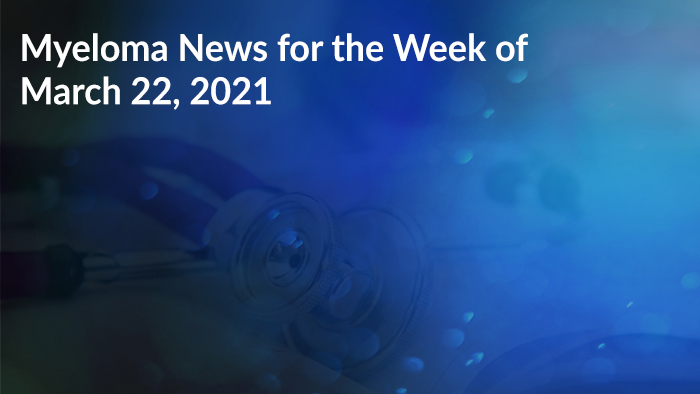Here is a roundup of articles and news stories the MYELOMA360 team found interesting this week.
Whole Genome Sequencing Offers New Diagnostic Insights for Multiple Myeloma Precursor Conditions
Researchers at Sylvester Comprehensive Cancer Center at the University of Miami Miller School of Medicine have shown that whole genome sequencing can help determine which patients with a multiple myeloma precursor condition, called MGUS or smoldering myeloma, progress to full-blown cancer. With further validation, these findings could revolutionize how these patients are diagnosed and treated.
READ ARTICLE
Daratumumab as Single Agent in Relapsed/Refractory Myeloma Patients: A Retrospective Real-Life Survey
In a retrospective study of 44 RRMM patients published in Frontiers in Oncology demonstrated that single agent daratumumab can be administered safely and provides an overall response rate of 37% with a disease control (stable disease or better) rate of 73%. After a median follow up of 7.8 months, median progression free survival (PFS) was 7.2 months and overall survival (OS) 7.8 months. Univariate analysis showed that patients with PR or better after 6 months of therapy had longer median PFS and OS (respectively 29.5 vs 3.6 months, p=0.0001 and 30.6 vs 3.9 months p=0.0001), confirmed by multivariate analysis.
Oral ixazomib, lenalidomide, and dexamethasone for newly diagnosed transplant-ineligible multiple myeloma patients
A recent study published in Blood showed that the triple-oral regimen of I-Rd is a feasible option for certain patients who can benefit from an all-oral triplet combination. The trial randomized transplant-ineligible NDMM patients to ixazomib 4 mg (n = 351) or placebo (n = 354) plus Rd. The primary endpoint was progression-free survival (PFS). Median PFS (mPFS) was 35.3 vs 21.8 months with ixazomib-Rd vs placebo-Rd, respectively (hazard ratio [HR], 0.830; 95% confidence interval, 0.676-1.018; P = .073; median follow-up, 53.3 and 55.8 months). Complete (26% vs 14%; odds ratio [OR], 2.10; P < .001) and ≥ very good partial response (63% vs 48%; OR, 1.87; P < .001) rates were higher with ixazomib-Rd vs placebo-Rd.
Is transplant advisable for all eligible patients with multiple myeloma in first remission?
Dr. Jonathan Kaufman, associate professor and associate vice-chair in the department of hematology and medical oncology and director of the division of hematology at Emory University School of Medicine answers this question. The short answer is “Yes.
We have not yet moved away from bone marrow transplant for these patients, and I believe the best outcomes remain with an early transplant.”
MM Patients Identified as a “Clinically Extremely Vulnerable” Population during COVID-19 Pandemic
A recent study published in British Journal of Haematology summarized the impact of the COVID-19 pandemic on patients with MGUS, SMM, and MM.
Updates to NCCN Guidelines in Multiple Myeloma
This article highlights changes to the MM NCCN Guidelines which were discuss ad last week’s NCCN Virtual Annual Conference. A few of the new additions include:
- PEPAXTO® (melphalan flufenamide)
- The combination of selinexor, bortezomib, and dexamethasone
- Combinations with selinexor as “useful in certain circumstances.”
- Combination of venetoclax with dexamethasone for certain patients with translation t(11;14)
NICE recommends new triple therapy treatment for multiple myeloma
The UK’s National Institute of Health and Care Excellence (NICE) has recommended a new second line therapy for multiple myeloma be made available on the UK’s National Health Service (NHS).Carfilzomib with dexamethasone and lenalidomide could be offered to approximately 2,000 NHS patients as a second line treatment for multiple myeloma.
Cilta-Cel Demonstrates Durable Responses in Relapsed/Refractory Multiple Myeloma
Ciltacabtagene autoleucel (cilta-cel) has a manageable safety profile at its recommended phase 2 dose, and yielded early, deep, and durable responses in heavily pretreated patients with relapsed/refractory multiple myeloma, according to data presented from the phase 1b/2 CARTITUDE-1 trial (NCT03548207)
Optimizing the Use of MRD Testing in Multiple Myeloma
Achieving minimal residual disease (MRD) negativity is an independent prognostic factor for survival in multiple myeloma (MM); however there remain questions about the optimal use of MRD. In a review published in Pathology, the journal of the Royal College of Pathologists of Australasia, researchers outlined implementation challenges, standardization across laboratories and clinical trials, and the integration of MRD assessment into the management of MM.
Antibody Treatment in Multiple Myeloma
Antibody therapy, which has become a critical option in the treatment of multiple myeloma (MM), includes monoclonal antibodies, antibody-drug conjugates, and bispecific antibodies. Anti-CD38 and anti-SLAMF7 monoclonal antibodies were the first to enter the MM portfolio as treatment options for relapsed/refractory MM. More recently, daratumumab has become important in the treatment of newly diagnosed MM, and a subcutaneous formulation has been approved. BCMA-targeted antibody-drug conjugates and bispecific antibodies, which are the newest antibody therapies to be investigated, provide additional therapeutic options for patients with heavily pretreated MM. This article reviews how antibody therapy has influenced the treatment of MM, describes the unique adverse event profiles of each relevant drug class, and explains how to incorporate antibody therapy into practice.
COVID-19 in a Multiple Myeloma Patient: Cellular and Humoral Immunity Against SARS-CoV-2 in a Short- and Long-term View
Multiple myeloma patients are often treated with immunomodulatory drugs, proteasome inhibitors or monoclonal antibodies until disease progression. Chronic therapy in combination with the underlying disease frequently results in severe humoral and cellular immunodeficiency, which often manifests in recurrent infections. Here we report on the clinical management and immunological data of one multiple myeloma patient diagnosed with COVID-19.
Evaluating Race and Time to Transplantation in Multiple Myeloma: The Mount Sinai Hospital Experience
Previous studies have found that Black patients with multiple myeloma undergo autologous stem-cell transplantation (ASCT) less frequently than their white counterparts, although the factors leading to decreased access and utilization have not been fully elucidated. To identify whether racial differences in transplantation timing played a role in these disparities, we retrospectively analyzed 410 Black and white patients who received their first transplant at The Mount Sinai Hospital between 2011 and 2016 (260 white and 150 Black patients).

